- Home
- Jasper Fforde
First Among Sequels Page 19
First Among Sequels Read online
Page 19
“I was just trying to explain,” I said, “how we find out about narrative flexations. Most of the time, the anomalies are just misreads and lazy readers getting the wrong end of the stick, but we have to check everything, just in case.”
“I can get this on the Text Grand Central tour for twenty shillings and with better company,” said Thursday1–4, looking pointedly at Thursday5.
“I’m interested, ma’am.”
“Creep.”
“Slut.”
“What did you call me?”
“Hey!” I shouted. “Cut it out!”
“She started it,” said Thursday1–4.
“I don’t care who started it. You’ll both be fired if you carry on like this.”
They fell silent, and we walked along the echoing corridors, past endless oak doors, all relating to some textual activity such as word meanings, idea licensing and grammasite control.
“The problem with pianos,” I began, “is that there aren’t enough to go around. Lots of people in the BookWorld play them, they frequently appear in the narrative, and they’re often used as plot devices. Yet for an unfathomable reason that no one can fully explain, there are only fifteen to cover the entire BookWorld.”
“Fifteen?” snorted Thursday1–4, who was lagging behind in a petulant manner. “How do they manage that, then?”
“With a lot of difficulty. Have a look.”
I opened a door off the corridor. The room was much like a psychiatrist’s office, full of bookshelves and with diplomas on the wall. There were two chairs, a desk and a couch. Two men were sitting in the chairs: A beard and pipe identified the first man immediately as a psychiatrist, and the second, who seemed desperately nervous, was obviously the patient.
“So, Mr. Patient,” began the psychiatrist, “what can I do for you?”
“Well, Doc,” muttered the patient unhappily, “I keep on thinking I’m a dog.”
“I see. And how long has this been going on?”
“Since I was a puppy.”
“Excuse me,” I interrupted, “I’m looking for the Piano Squad.”
“This is Very Old Jokes,” explained the psychiatrist apologetically. “Pianos are down the corridor, first on the left.”
“Sorry,” I muttered somewhat sheepishly, and quietly closed the door. “I keep on doing that,” I murmured. “They should really label these doors better.”
We walked along the corridor, found the correct door and opened it to reveal a room about fifty feet square. The walls were roughly plastered, and the vaulted stone ceiling was supported in the center of the room by a sturdy pillar. Set into the wall to our right was an aperture the size of a single garage, painted bright white and illuminated from within by several hundred lightbulbs. As we watched, there was a faint buzz, a flicker, and an ornate cabinet piano suddenly appeared in the aperture. Almost instantly a workman dressed in brown overalls and with a flat cap moved forward to wheel it out on well-oiled castors. Facing the bright white opening was a control desk that looked like a recording studio’s mixing console, and behind this were two men of youthful countenance, dressed in linen suits. They were wearing headsets and had the harried look of people under great pressure.
“Upright rosewood returned from Sons and Lovers,” whispered the one who was standing. “Stand by to send the Goetzmann into Villette.”
“Check!” shouted the other man as he adjusted the knobs and sliders on the console. The workman pushed a Goetzmann grand into the empty aperture, stepped back, called “Clear,” and with another buzz, the piano vanished.
They looked at us as soon as we entered, and I nodded a greeting. They nodded one back and returned to their work.
“Observe,” I said to the Thursdays, pointing to a large indicator panel on the wall behind the men. The fifteen pianos were listed down the left-hand side, and in columns next to them were indicator lights and illuminated panels that explained what was happening to each. The uppermost piano on the list we noted was a “generic” grand and was currently inside Bleak House. It would be available in a few minutes and was next due to appear in Mill on the Floss, where it would stay for a number of scenes until departing for Heart of Darkness. While we watched, the indicator boards clicked the various changes as the two operators expertly moved the pianos back and forth across fiction. Below the indicator boards were several other desks, a watercooler and a kitchenette and coffee bar. There were a few desultory potted plants kicking around, but aside from several rusty filing cabinets, there was not much else in the room.
“Fifteen pianos is usually ample,” I explained, “and when all pianos are available for use, the Piano Squad just trots along merrily to a set timetable. There are a few changes here and there when a new book requires a piano, but it generally works—eightysix percent of pianos appear in nineteenth-and early-twentieth-century literature.”
I pointed to the indicator board.
“But if you notice, eight pianos are ‘status unavailable,’ which means that they have been pulled out of frontline service for maintenance.” I waved the report Bradshaw had handed me. “There was an administrative mix-up; we usually have one piano offline at a time, but some clot had them all refitted at once to save costs.”
The Thursdays looked at the two operators again, and as we watched, the upright piano made of rosewood and with inlaid brass was moved from Sons and Lovers to The Mayor of Casterbridge and then on to The Turn of the Screw.
“That’s right,” I said, “Charles and Roger are having to spread seven pianos around the entire canon of English fiction. Hang on, it looks as though we’re coming to a break.”
They did indeed seem to be about to stop work for a few minutes. The two operators relaxed, stopped what they were doing, removed their headsets and stretched.
“Hello, Thursday,” said the younger of the two in a quiet whisper. “Brought your family in to work?”
“Not a chance,” I laughed. “Jurisfiction Cadets Thursday5 and Thursday1–4, meet Charles and Roger of the Piano Squad.”
“Hello!” yelled Roger, who appeared not to be able to converse at anything less than a shout. “Come up and have a look-see!”
The Thursdays went to join Roger at the console, Thursday5 because she was genuinely interested and Thursday1–4 because Roger was actually quite attractive.
“Just how many piano mentions are there in fiction?” asked Thursday5.
“Thousands,” he replied, “but in varying degrees. Much of nineteenth-century literature—the Brontës, Hardy and Dickens in particular—is literally awash with pianos, but they’re rarely played. Those are the easy ones to deal with. Our pianos one to seven are nonfunctioning and are for description only. They are simply on an automatic circuit of the BookWorld, appearing momentarily in the text before flashing off to appear elsewhere.” He turned to the indicator board. “If you look at the panel, our trusty old P-6 Broadwood upright is currently on page three hundred and thirty-nine of The Lost World, where it occupies a space near the standard lamp in the Pottses’ villa in Streatham. In a few moments, it will jump automatically to the subbasement on page ninety-one of Howards End, where it will sit beneath a Maud Goodman painting. A moment later it will jump off to page one hundred and sixty-one of Huckleberry Finn and the Grangerford parlor.”
“However,” added Charles in a whisper, “Eliot, Austen and Thackeray are not only knee-deep in pianos, but working ones which in many instances are the linchpin of a scene. And those are the ones we have to be most careful about regarding supply and demand. Amelia Sedley’s piano in Vanity Fair is sold at auction and repurchased by Dobbin to be given to her as a gift, and the singing and accompaniment within Austen do much to add to the general atmosphere.”
Thursday5 nodded enthusiastically, and Thursday1–4, for the first time that day, actually expressed a vague interest and asked a question: “Can’t someone just make some more pianos?”
“There is a measure of economy that runs throughout the BookWorld,”
he replied. “We count ourselves lucky—pianos are positively bountiful compared to the number of real dusty gray and wrinkly elephants.”
“How many of those are there?”
“One. If anyone needs a herd, the Pachyderm Supply Division has to make do with cardboard cutouts and a lot of off-page trumpeting.”
The Thursdays mused upon this for a moment, as Charles and Roger donned their jackets and prepared to take a few hours off while I took over. I’d done it before, so it wasn’t a problem.
“Everything’s pretty much set on automatic,” explained Charles as they headed out the door, “but there are a few manual piano movements you’ll need to do—there’s a list on the console. We’ll be back in two hours to take care of the whole Jude the Obscure letter-in-the-piano plot-device nonsense and to somehow juggle the requirements of a usable piano in Three Men in a Boat with the destruction of a Beulhoff grand in Decline and Fall.”
“Sooner you than me,” I said. “Enjoy your break.”
They assured me that they would and departed with the man in overalls, whose name, we learned, was Ken.
“Right,” I said, sitting down and putting my feet up on the console. “Get the coffee on, Thursday.”
Neither of them budged an inch.
“She gave you an order,” said Thursday1–4. “And I take mine black and strong.”
“Humph!” muttered Thursday5, but she went off to put the kettle on nonetheless.
Thursday1–4 took off her greatcoat, hung it on a peg and sat down in one of the other chairs.
“So…we just sit here and watch pianos move around the BookWorld?” she asked in a somewhat sneering tone of voice. Mind you, she usually spoke like that, so it was nothing unusual.
“That’s exactly what we do. Much of Jurisfiction’s work is like this. Boring but essential. Without an uninterrupted supply of pianos, much essential atmosphere would be lost. Can you imagine The Woman in White without Laura’s playing?”
Thursday1–4 looked blank.
“You don’t know what I’m talking about, do you?”
“The classics are too slow for me,” she replied, idly taking one of her automatics from its holster and removing the clip to stare at the shiny rounds. “Not enough action. I’m more into David Webb.”
“You’ve read Robert Ludlum?” I asked in surprise. Most bookpeople didn’t read. It was too much like a busman’s holiday.
“Nope. It’s Dave I like, especially when he’s Jason Bourne. Knows how to show a lady a good time and can pop a head shot from a thousand yards.”
“Is there anyone in fiction you haven’t slept with?”
“I love The Woman in White,” put in Thursday5, who had returned with a tray of coffees—but with a glass of water for herself, I noticed. “All that Mozart to express her love for Hartright—dreamy!”
I took my coffee, and we watched the lights flicker on the console as a nonfunctioning Bösendorfer was moved from Our Mutual Friend to Persuasion, where it jumped rapidly between the twelve different scenes in which it was mentioned before vanishing off into Wives and Daughters.
“I think atmosphere in novels is overrated,” said Thursday1–4, taking a sip of coffee before she added patronizingly, “Good coffee, Thursday—jolly well done.”
“That’s put my mind at rest,” replied Thursday5 sarcastically, something that Thursday1–4 missed.
“Are there any cookies?” I asked.
“Yes,” echoed Thursday1–4, “are there any?”
Thursday5 huffed, got up, found some Jaffa cakes and placed them on the console in front of me, glaring at Thursday1–4 as she did so.
“Don’t underestimate atmosphere,” I said slowly, helping myself to a Jaffa cake. “The four opposing forces in any novel are atmosphere, plot, character and pace. But they don’t have to be in equilibrium. You can have a book without any plot or pace at all, but it has to make up for it in character and a bit of atmosphere—like The Old Man and the Sea. Most thrillers are plot and pace and nothing else, such as Where Eagles Dare. But it doesn’t matter; each to a reader’s own—”
I stopped talking, because a warning light was flashing on the console in front of us.
“Hmm,” I murmured as I leaned closer, “they’re overrunning in The Dubliners, and Ulysses needs an upright piano for Mr. Dedalus to comment upon at the Ormond Hotel in less than a minute’s time.”
“Isn’t there a spare piano at Norland Park?” asked Thursday5.
“No—Marianne took it with her to Devon, and it’s currently one of those being overhauled.”
I scanned the knobs and switches of the console, looking for a spare piano that could be redirected. I eventually found one in Peter Pan. It was only referred to in a line of dialogue, so I redirected it to Ulysses as quickly as I could. Too quickly, to be honest, and I fumbled the interchange.
“Shit,” I muttered under my breath.
“What?”
“Nothing,” I replied, knowing full well that no one would notice. I’d placed it in the wrong part of the Ormond Hotel. I didn’t have time to worry about this, however, as another warning light was flashing. This was to alert us that the first manual piano movement that Roger and Charles had left us with was approaching. I picked up the handwritten note and read it.
“We’ve got the Goetzmann grand returning from Villette, and it has to be sent with piano stool 87B into Agatha Christie’s They Do It with Mirrors. Who can see a piano stool anywhere?”
Neither of the Thursdays moved an inch. Thursday5 eventually tapped Thursday1–4 on the arm and said, “Your turn. I did the coffee.”
“In that case,” replied Thursday1–4 with impeccable twisted logic, “it must have been my turn to do the Jaffa cakes.”
“I suppose.”
“Then, since you very kindly undertook that task on my behalf, it’s your turn to do something again—so find the sodding piano stool and stop bothering me with your bleating.”
I laid a hand on Thursday1–4’s arm and said, “Find the piano stool, Thursday.”
She tutted haughtily in a manner that Friday would have approved of but got up and had a look around the room, eventually finding it near a heap of sheet music, a few music stands and a dusty bassoon.
“Here,” she said in a bored tone, lifting the lid to look inside. Just at that moment, there was a buzzing noise, and the Goetzmann grand appeared in the brightly lit aperture in the wall.
“Right on time.”
I twiddled a few knobs to set its onward journey, told Thursday1–4 to put the piano stool with it, which she did, and then, with yet another buzz, I sent it on to the great hall of Stonygates inside Agatha Christie’s They Do It with Mirrors.
“Good,” I muttered, crossing that first task off the list. “We’ve got nothing else for a half hour.”
But my troubles weren’t nearly over, as Thursday5 had sat in the chair recently vacated by Thursday1–4.
“You’re in my seat.”
“It’s not your seat.”
“I sat in it first, so it’s mine.”
“You can’t do dibs on seats, and besides, you don’t own it.”
“Listen,” growled Thursday1–4, “do you like doing crochet?”
“Yes, so…?”
“Then perhaps you can imagine how tricky that might be…with broken fingers.”
Thursday5’s lip trembled for a moment. “I’m…I’m…sure we can discuss this like rational adults before resorting to anything so crude as violence.”
“Perhaps we could,” returned Thursday1–4, “but it’s far easier with me telling you how it’s going to be. Now, get your tie-dyed butt out of my seat.”
“Thursday?” I said.
“I can deal with this,” snapped Thursday5 in a rare show of annoyance. “I don’t need to be rescued like a child every single time Miss Slagfest here opens her trap!”
“I’m not meddling,” I replied. “All I want to know is where Thursday1–4 got that pistol.”
“This?” she said, holding up the small black automatic that I’d suddenly noticed she was holding. “It’s really cool, isn’t it? A Browning twenty-six-caliber standard single-action automatic with slide and grip safety.”
“Where did you get it?”
“I found it,” she retorted defensively, “so I’m keeping it.”
I didn’t have time for this.
“Tell me where you found it, or you’ll be its next victim.”
She paused, then said, “It was…in that piano stool.”
“Idiot!” I yelled, getting up and demanding she hand it over, which she did. “That’s an essential plot point in They Do It with Mirrors! Why can’t you just leave things alone?”
“I thought—”
“That’s the problem. You don’t. Stay here while we sort this out, and don’t touch anything. I repeat: Touch nothing. Do you understand?”
“Yes, yes, of course I understand—what do you think I am, a child?”
I didn’t have time to argue, so after telling Thursday5 to follow me closely, I jumped out of the Piano Squad to the Great Library, and from there we made our way into Agatha Christie’s They Do It with Mirrors.
We arrived at Stonygates in the short length of dimly lit corridor that connected the square lobby with the great hall. We pressed ourselves into the shadows, and I looked inside the hall. It was a large room that oozed Victorian Gothic gloominess, with dark wood and minimal lighting. There were a half dozen or so people chattering, but more important, directly ahead of us was the Goetzmann grand that we had dispatched not two minutes before. And in front of this, the piano stool to which the weapon had to be returned. I was about to chance my luck and sneak in but had not gotten two paces when a young man came and sat on the piano stool and began to play. I retreated into the shadows and felt Thursday5 grip my arm nervously as the lights flickered and went out, leaving the house in semidarkness. We backed farther into the shadows as a large man with a sulky expression came out of the door and vanished into the gloom, muttering about the fuses. A few minutes later, an elderly woman tottered to the dining room and back to retrieve something, and almost immediately the front door was pushed violently open and a young man strode into the hall in an overdramatic manner. This was followed by an argument, the sound of the study door opening and closing, more muffled shouting and eventually two shots. With the characters in the room thus distracted, I padded softly to the man seated at the piano and tapped him lightly on his shoulder. He looked up with some surprise, and I showed him my Jurisfiction badge. I raised my eyebrows, placed a finger to my lips and gestured him to join the people on the other side of the room. He did as I asked, and once his back was turned, I slipped the small automatic into the piano stool, between a copy of Handel’s Largo and Chopin’s Preludes.

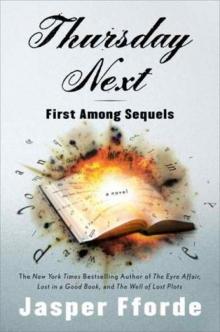 First Among Sequels
First Among Sequels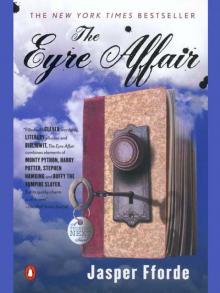 The Eyre Affair
The Eyre Affair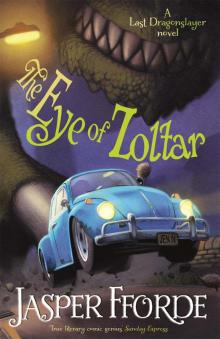 The Eye of Zoltar
The Eye of Zoltar The Woman Who Died a Lot
The Woman Who Died a Lot The Fourth Bear
The Fourth Bear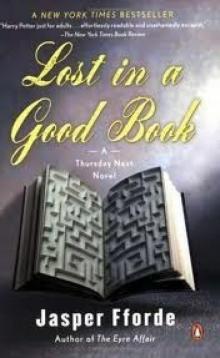 Lost in a Good Book
Lost in a Good Book Something Rotten
Something Rotten The Well of Lost Plots
The Well of Lost Plots The Big Over Easy
The Big Over Easy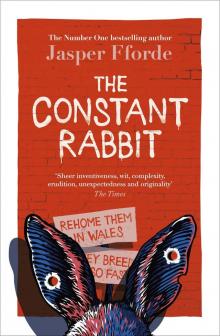 The Constant Rabbit
The Constant Rabbit The Last Dragonslayer
The Last Dragonslayer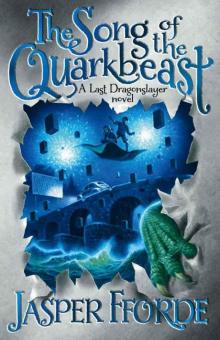 The Song of the Quarkbeast
The Song of the Quarkbeast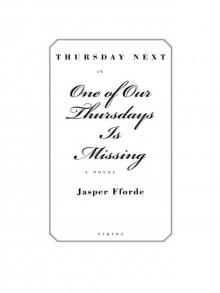 One of Our Thursdays Is Missing
One of Our Thursdays Is Missing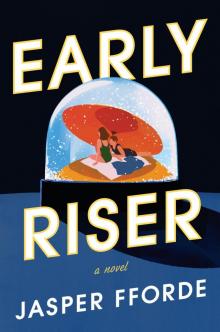 Early Riser
Early Riser Early Riser_The new standalone novel from the Number One bestselling author
Early Riser_The new standalone novel from the Number One bestselling author Something rotten n-4
Something rotten n-4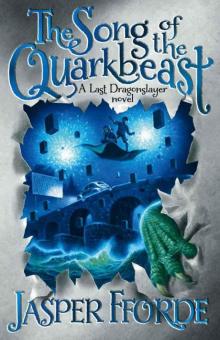 The Song of the Quarkbeast tld-2
The Song of the Quarkbeast tld-2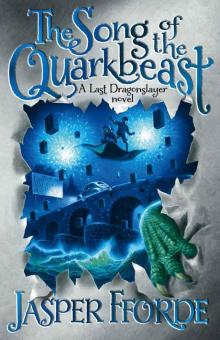 The Song of the Quarkbeast: Last Dragonslayer: Book Two
The Song of the Quarkbeast: Last Dragonslayer: Book Two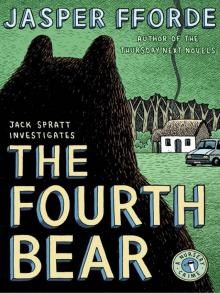 The Fourth Bear nc-2
The Fourth Bear nc-2 Lost in a Good Book tn-2
Lost in a Good Book tn-2 The Well of Lost Plots n-3
The Well of Lost Plots n-3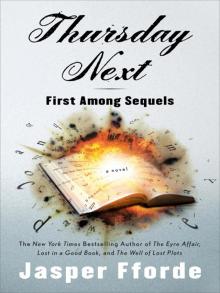 Thursday Next in First Among Sequels
Thursday Next in First Among Sequels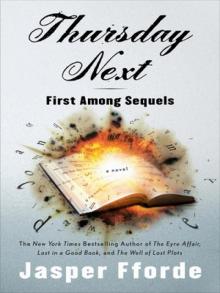 First Among Sequels tn-5
First Among Sequels tn-5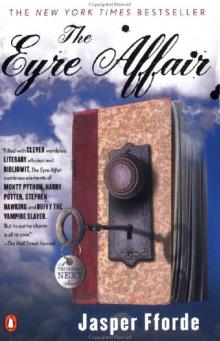 The Eyre Affair tn-1
The Eyre Affair tn-1